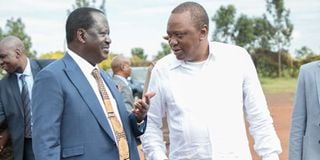Court derails BBI referendum train

President Uhuru Kenyatta and ODM leader Raila Odinga.
What you need to know:
- According to the judges, the petitioners have asked the court to determine the constitutionality of the BBI process.
- County assemblies and Parliament can, however, go on with process as ruling is awaited
The High Court has punctured the Building Bridges Initiative by stopping the electoral commission from subjecting the Constitution of Kenya (Amendment) Bill to a referendum until petitions against the proposed changes are determined.
Five judges yesterday barred the Independent Electoral and Boundaries Commission (IEBC) from taking any action to advance the proposed change of the Constitution.
IEBC has three crucial roles in the process to amend the Constitution through a popular initiative: to verify signatures submitted by its promoters, submit the draft Bill to county assemblies and, once Parliament considers the Bill, act on a notification by the President to hold a referendum within 90 days.
The first two stages have been cleared, as the Bill is now before county assemblies. The Bill should it get the backing of at least 24 counties, whose speakers are required to notify the Speakers of both Houses of Parliament.
BBI process
Immediately after the ruling, lawyer Paul Mwangi of the BBI secretariat asked the court to clarify whether the order stops the county assemblies and Parliament from considering the Bill.
Justices Joel Ngugi, George Odunga, Jairus Ngaah, Janet Mulwa and Enock Mwita said though their order is not directed to the legislative bodies, they should be aware that their decisions in regard to the approval of the Bill can be declared invalid upon full hearing of the case.
Rushing the process, the judges said, does not invalidate the possibility of declaring it invalid because a court cannot be barred from interrogating the constitutionality of the entire BBI process.
According to the judges, the petitioners have asked the court to determine the constitutionality of the BBI process and whether the process is within the letter and spirit of the Constitution.
Unconstitutional
“We decline to interfere with the legislative process, but the court can interfere at the tail end. Even when considering the Bill, be aware the court can declare it unconstitutional upon hearing the petitions,” said the judges.
According to the law, the High Court can nullify the outcome of a referendum if it is proven it was conducted in violation of the Constitution.
While ruling on two applications filed by the Turkana County Assembly and Thirdway Alliance Party, seeking to halt the constitutional amendment process, the court stated that if the referendum is passed, the petitions will be rendered an academic exercise.
The judges said the order will remain in force until seven petitions filed by different individuals and rights’ advocacy groups, challenging the process of amending the Constitution through the BBI, are determined.
Temporary order
They explained that their decision is to preserve and prevent the petitions from being rendered irrelevant, should the very constitutional amendments they are challenging take place.
The court found the grievances raised by the petitioners against the BBI, such as lack of a referendum law to guide county assemblies and possibility of the county assemblies deploying different positions on public participation, are not frivolous.
In urging the court to issue the temporary order to suspend the process, Thirdway Alliance and Turkana County Assembly had argued that the proponents of the constitutional amendments are using public funds which are not recoverable.
But the judges said there was no evidence that the activities of Parliament and county assemblies in considering the BBI Bill will entail use of public resources outside their routine legislative duties.





